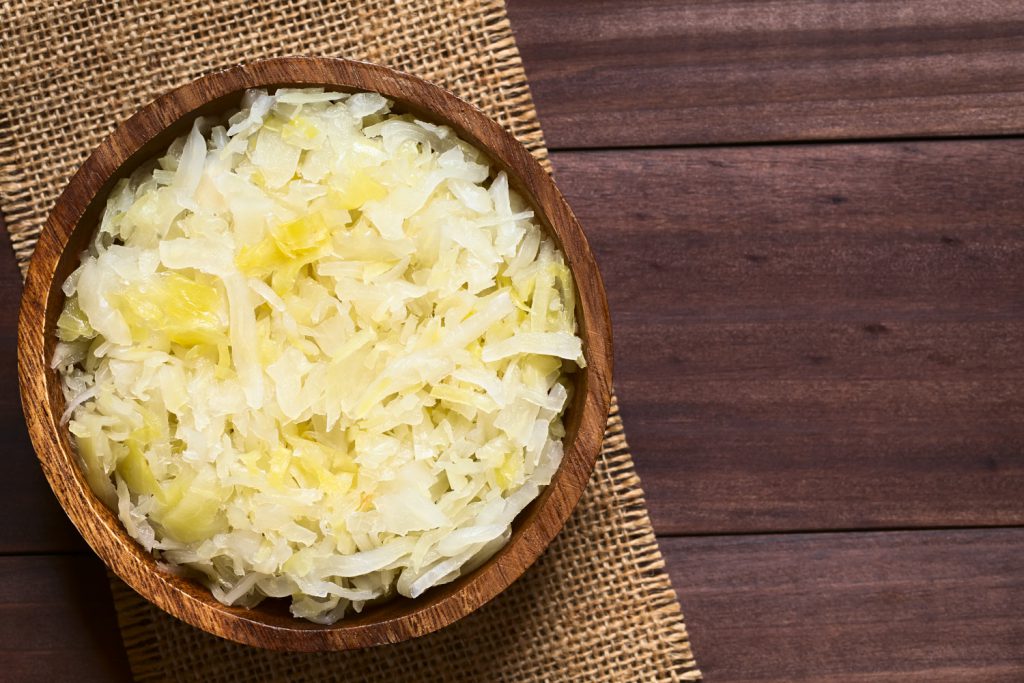
Sauerkraut tastes excellent with sandwiches, hot dogs, and barbecued food in general. The fact that this favorite condiment has nutrient value is only a bonus. Here we are going to discuss Can Dogs Eat Sauerkraut?
Whatever the situation, are you wondering whether your pet can have some sauerkraut? Well, the answer is yes. Your fluffy friend can eat Sauerkraut.
Sauerkraut is finely cut, fresh cabbage that’s been fermented with several types of lactic acid bacteria.
This particular cabbage can be eaten alone or consumed with hot dogs, casseroles, and meat dishes; Sauerkraut is also a wholesome food that dogs can eat.
Since most dogs will not eat sauerkraut alone, creative dog owners have found ways to integrate Sauerkraut in their pet’s meals so powerful smell and taste do not irritate a dog’s sensitive palate and nose.
You might also like our review of the Best low-fat canned dog food that is available on a separate page.
Nutritional Benefits of Sauerkraut
Believe it or not, dogs can’t only eat Sauerkraut, but it also has some significant health advantages. This is fantastic news for pet owners who love sauerkraut at picnics as well as an extra little something to spice up a portion of direct, odd dog food.
Fermented foods may benefit your dog by helping their digestive system flush out heavy metals and other toxins within the body. Vitamin C and K2, which promote metabolic action, are created by the fermentation process. Giving Sauerkraut to your pet means enhancing its metabolic process. Lactic acid functions to repress compounds and combat cancer, although not damage healthy cells.
The question is probably whether or not your dog will like Sauerkraut. Sauerkraut, like other fermented veggies, has a very intense flavor.
- Authentic, traditional organic kraut, a centuries old health food; no additives or preservatives of any kind
- Made from Eden selected organic cabbage, chosen for excellent sauerkraut making qualities, and EDEN Sea Salt, naturally fermented for at least six week
- Enjoy the superb benefit, delicious flavor, and fine texture of traditionally made EDEN Organic Sauerkraut; se it to make soups and casseroles, on sandwiches, in salads, and vegetable dishes, or simply enjoy it as a snack or side dish
- Organic, Kosher and pareve, vegan, wheat free & gluten free
- Rich in vitamin C and a good source of dietary fiber
Prices pulled from the Amazon Product Advertising API on:
Product prices and availability are accurate as of the date/time indicated and are subject to change. Any price and availability information displayed on [relevant Amazon Site(s), as applicable] at the time of purchase will apply to the purchase of this product.
Gastrointestinal Health
As Sauerkraut undergoes the process of fermentation, dogs given Sauerkraut receive “good” bacteria (probiotics), which will help enhance and maintain gut health. Fiber-rich sauerkraut also prevents bloating, constipation, and flatulence.
By enhancing enzymatic action from the gut, Sauerkraut can also decrease a dog’s danger of suffering gastric ailments and chronic diarrhea credited to irritable bowel syndrome.
Rich in Iron
All warm-blooded animals need iron to boost energy, regulate metabolism, and encourage blood flow.
Without enough iron, some puppies ‘ organs might not get enough oxygen to operate normally. Iron deficiency is not a good thing in dogs because it can lead to severe disorders.
Deficiency of iron may also result in psychological slowness and fatigue in puppies, leading even to anemia.
Improve Skin and Coat
Vitamin A and carotene in sauerkraut can act as antioxidants to enhance a dog’s eye health and reduce the risk of cataract formation in older dogs. Vitamin A, in particular, contributes to tissue development. If your dog has a deficiency of vitamin A, Sauerkraut will do wonders. Dogs with itchy, tender skin and dull coats could have a vitamin A deficiency, and this food aids in filling that deficiency.
Boost Immune System Health:
One cup of Sauerkraut provides a dog with a lot of vitamin C necessary for their immune system. Vitamin C boosts white blood cell generation and stimulates cell regeneration.
Sauerkraut is a vital source of Vitamin C, which plays a vital role in strengthening the immune system. Along with this, Vitamin C also enhances cells’ regeneration and the generation of white blood cells.
Collagen formation required for healthy development and development of organs, organs, and blood vessels and bones is just another advantage of vitamin C within Sauerkraut.
Make Bones Stronger
Minerals found in Sauerkraut are vital for developing strong bones in puppies and dogs. It also helps maintain bone health in younger dogs. Vitamin K2 supports other minerals, which help maintain a dog’s bone ethic and capability to demineralize as dogs get older.
Anti-Inflammatory Effects
Sauerkraut is rich in antioxidants and phytonutrients which fight inflammation and free radical damage.
Phytonutrients in sauerkraut and other leafy vegetables mostly act as anti-inflammatory antioxidants. It reduces joint and muscle pain in dogs with arthritis or other musculoskeletal issues.
Sauerkraut probiotics also provide anti-inflammatory attributes that could help improve allergies, reduce incidences of disease, and encourage a dog’s overall health and well-being.
Probiotics in this food may also lessen disease, enhance allergies, and also help encourage your pups’ general well-being.
Salt Content in Sauerkraut
While sauerkraut offers numerous health benefits for dogs, it’s high in sodium. If your dog has been diagnosed with cardiovascular or kidney disease, speak to your vet before incorporating Sauerkraut into your dog’s diet plan.
You might also like our recent post Can Dogs Eat Sardines available on the separate page.
How Sauerkraut Improves Dog’s Health?
Probiotic bacteria form colonies of good bacteria inside the canine gut to help protect dogs from many different gastrointestinal ailments like gastrointestinal tract inflammation and canine gastroenteritis.
The new Sauerkraut comprises more than a dozen strains of good bacteria that restore the balance of good and bad bacteria in the canine gut. Whenever there are too many harmful bacteria, dogs may suffer recurring ailments, diarrhea, skin irritations, and even melancholy.
Other advantages of probiotics from sauerkraut for dogs are:
- Helps reduce cancer risk – Sauerkraut may help reduce cancer risk in dog breeds prone to tumor development (Sauerkraut Contains isothiocyanates or anti-carcinogenic chemicals. Powerful Anti-inflammatory properties).
- Improves eye health – Sauerkraut helps preserve canine eye health by providing two antioxidants – zeaxanthin and lutein -which support tissue and blood vessel growth while protecting from cataracts.
- Good source of minerals – Provides minerals such as magnesium, potassium, manganese, and copper for skin, muscle, and organ health.
- Good for Digestive Health – Sauerkraut may be beneficial for your dog’s digestive health. That is why homemade heating kraut is a terrible idea. It’ll kill precious enzymes and microbes. Quality sauerkraut aids in the development of healthy gut flora that may, in turn, protect your pet from horrible digestive tract infections. Digestion can also be enhanced.
- Super Food – For raw and unpasteurized types, sauerkraut is a super-food with the carcinogenic possibility for pets!
Tips for Feeding Sauerkraut to Dogs
To start getting your dog used to sauerkraut, chop some up into tiny pieces and mix approximately one tablespoon in a can of moist dog food. You may also add a small portion of salmon or other smelly fish to make the food more palatable.
Be aware that some dogs may not eat veggies; however, you try and hide them into ordinary dog food. Sometimes, weakening the strong smell and flavor of sauerkraut may encourage dogs to eat food blended with sauerkraut. Try draining the sauerkraut using a colander and rinsing the sauerkraut with cold water.
You might also place sauerkraut in a bowl, then cover the kraut with lemon juice or water and simmer for approximately 30 minutes to decrease sauerkraut’s powerful smell and taste.
Another method to encourage dogs to eat sauerkraut is to cook it with sliced apples to make sauerkraut mellower and sweeter. Since sauerkraut has been fermented, cooking sauerkraut will not lessen the number of vitamins, minerals, and probiotics it provides to improve your pet’s well-being.
For demanding dogs, getting them to eat sauerkraut may be a little bit challenging, especially at first. For dogs who are new to sauerkraut, start with small quantities. Mix the sauerkraut in using their typical food or with different foods that they want to eat.
Start with two or three sauerkraut each day and slowly add more sauerkraut to a pet’s diet over time to reduce stomach upset.
How Much is too Much?
Most experts believe you could give your dog between 1 and 3 teaspoons of Sauerkraut 20 pounds of body fat. Do your best not to give more as store-bought sauerkraut will contain a whole lot of salt, which is not great for your furry friend.
Conclusion
Your dog can eat some sauerkraut. This condiment is best homemade, unpasteurized, and raw. Go as far as you can to make sure you’ve got a healthy topping in your palms.
With sauerkraut comes useful antioxidants, vitamins, and outstanding probiotic properties (good for the intestine) because of the fermentation procedure.
Although a small number of store-bought sauerkraut is generally benign, make sure you restrict flea intake for your dog’s sake.
